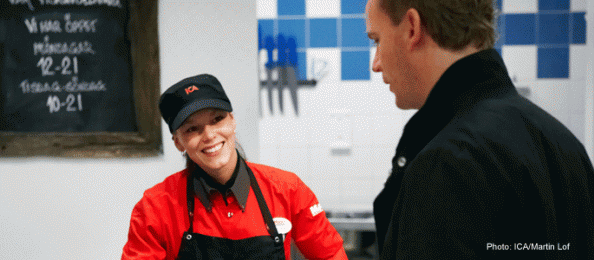Taking Action for Sustainable Fishing
For food retailers selling fish and seafood to consumers these days, one of the “trickiest” questions is how to ensure that the world’s oceans are not overfished. For ICA, a market leader in Sweden that also operates in Norway and in the Baltic countries, this is an issue of great concern. The question became more urgent in 2009 because the media, environmental organizations, and customers expressed great concern about sustainable fishing.
In 2009 ICA offered almost 200 fish products as part of its private-label food assortment. The method for determining which types of seafood should be sold is done by evaluating each species individually. In doing so, ICA chooses to listens to the opinions of, for example, the World Wide Fund for nature (WWF), and the International Council for the Exploration of the Sea (ICES).
The aim is not only to stop selling certain types of fish and seafood products but also to find ways, if possible, to improve the environmental situation.
Tropical shrimp were thrown out and eco-labeled fish and a select range of tuna were put in. Those were some of the actions of Swedish food retailer ICA toward achieving a more sustainable fish assortment in 2009. For a retail group with high goals for sustainability, education, transparent information, and clear policies are crucial.

Following WWF’s fish guide
During the first six months of 2009, ICA Sweden’s fish assortment contained two red-listed (forbidden to eat) products according to WWF’s fish guide: plaice and tropical shrimp. The suppliers of the wild and farm-raised tropical shrimps were carefully reviewed, as is mandatory. Changes in the buying criteria from the suppliers in combination with internal discussions about sustainability aspects led to a decision by ICA to stop carrying the products. Since approximately 1,400 of the ICA Group’s 2,220 stores are run by independent retailers, ICA encouraged the retailers to do the same.
“There are plenty of companies selling tropical shrimp to stores but besides taking the products out of our assortment, we recommended that the retailers avoid tropical shrimp from other suppliers until there is a certifiable and credible standard for farming tropical shrimp. The WWF is close to establishing such a standard and ICA is carefully following their work,” says Kerstin Lindvall, Senior Manager of Environmental and Social Responsibility at ICA Sweden AB.
At the same time that ICA took action and removed the tropical shrimp, plaice – which to this day has been the only red-listed fish sold under the ICA brand name – suddenly was approved by Marine Stewardship Council (MSC). In mid-2009, the red-listed fishes had been removed from the main assortment. In addition, ICA decided to replace the yellowfin tuna with skipjack tuna, which has a more sustainable stock.
Important training
Cod is another fish that a retailer has to be attentive of when it comes to origins. Since 2004, all cod in ICA’s main assortment is caught in the Barents Sea, where it is considered sustainable and has been given a green light (recommended) in WWF’s fish guide. But very close by Sweden in the Baltic Sea’s eastern stock, it is not considered sustainable.
“ICA´s main selection still contains no cod from our nearby Baltic Sea. And we strongly recommend retailers who buy their own fish to make sure that the cod harvest does not come from eastern stocks in the Baltic Sea and also not to accept fillets smaller than 30 centimeters,” says Lindvall.
The ICA Group continuously trains retailers and store employees to avoid having WWF’s red-listed fish end up on store seafood counters. “We also provide a checklist for retailers to use when they buy fish and shellfish directly from suppliers,” adds Lindvall. In 2009 ICA provided training in sustainable fishing to its largest direct suppliers of fresh seafood. The WWF and the Swedish Society for Nature Conservation assisted in the training.
For consumers, ICA provides information on the product labels about where the fish is caught. In addition, consumers can trace where ICA’s private-labeled products of cod, haddock, and Pollack are caught through the company’s website: www.ICA.se.
ICA’s Good Business
ICA’s corporate responsibility work is built on a foundation of seven position statements called ICA’s Good Business. These position statements are in line with the Global Compact’s Ten Principles on human rights, labor standards, the environment, and anti-corruption.
With ICA’s Good Business, we mean that ICA will:
- be driven by profitability and high ethical standards
- listen to customers and always base decisions on their needs
- nurture diversity and growth among its employees
- maintain an open dialogue internally and with the community
- ensure quality and safe products
- promote a healthy lifestyle
- adapt sound environmental practices and promote sustainable development
An intranet-based interactive training regarding ICA’s Good Business practices is mandatory for everyone within ICA.
This project description was originally presented in the Global Compact International Yearbook 2010.
Ms Sekkens works vor ICA in Sweden.
About Us // Privacy Policy // Copyright Information // Legal Disclaimer // Contact
Copyright © 2012-2018 macondo publishing GmbH. All rights reserved.
The CSR Academy is an independent learning platform of the macondo publishing group.









